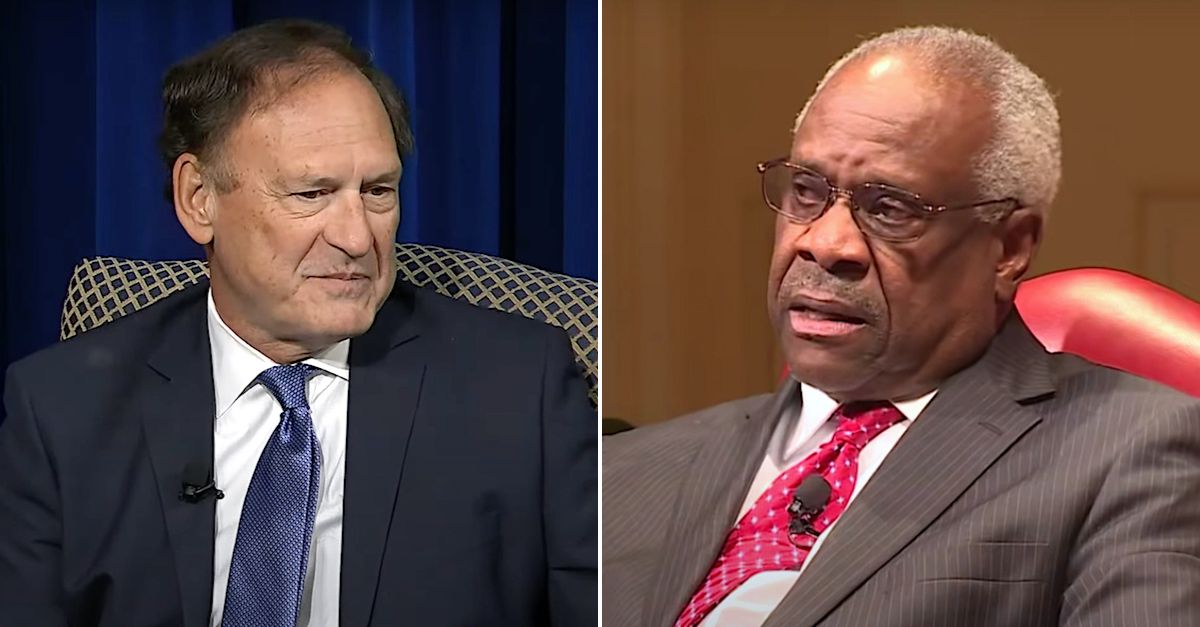
Left, Associate Justice of the Supreme Court Samuel Alito. (Image via YouTube screengrab/The Heritage Foundation.) Right, Associate Justice of the Supreme Court Clarence Thomas.
(Image via YouTube/Library of Congress.)
Conservative Justices Clarence Thomas and Samuel Alito found themselves on the opposite sides of a 7-2 decision on Thursday, with Thomas leading a majority upholding Federal Reserve funding of the Consumer Financial Protection Bureau (CFPB), an agency created during the Obama administration years after the 2008 financial crisis.
Thomas, joined by Chief Justice John Roberts and Justices Sonia Sotomayor, Elena Kagan, Brett Kavanaugh, Amy Coney Barrett, and Ketanji Brown Jackson, concluded that funding of the agency which came about under the Dodd-Frank Wall Street Reform and Consumer Protection Act did not run afoul of the Appropriations Clause of the Constitution.
“For most federal agencies, Congress provides funding on an annual basis. This annual process forces them to regularly implore Congress to fund their operations for the next year. The Consumer Financial Protection Bureau is different,” Thomas explained. “The Bureau does not have to petition for funds each year. Instead, Congress authorized the Bureau to draw from the Federal Reserve System the amount its Director deems ‘reasonably necessary to carry out’ the Bureau’s duties, subject only to an inflation-adjusted cap.”
“In this case, we must decide the narrow question whether this funding mechanism complies with the Appropriations Clause. We hold that it does,” Thomas wrote, with six more justices agreeing.
Alito was not one of those justices. Nor was Justice Neil Gorsuch.
In a dissent, which Gorsuch joined, Alito accused the majority of rendering the Appropriations Clause a “minor vestige” by upholding a “novel statutory scheme” and allowing a “powerful” agency to “bankroll its own agenda without any congressional control or oversight.”
Alito appealed to English history and the American founding to buttress his conclusion that majority strayed from the proper path at the expense of the legislative branch.
“That is not what the Appropriations Clause was understood to mean when it was adopted,” Alito wrote. “In England, Parliament had won the power over the purse only after centuries of struggle with the Crown. Steeped in English constitutional history, the Framers placed the Appropriations Clause in the Constitution to protect this hard-won legislative power.”
When the high court took up the case, it was clear that the matter had potential to upend the CFPB for violating the Constitution. After all, the conservative U.S. Court of Appeals for the Fifth Circuit had decided that the funding mechanism was an unconstitutional end run around the Appropriations Clause.
The majority disagreed with the Fifth Circuit on Thursday, however, to the dismay of Alito and Gorsuch.
Alito called it “undeniable that the combination of features in the CFPB funding scheme is unprecedented” and was “carefully designed to give the Bureau maximum unaccountability.”
Alito, who recently wondered during Donald Trump’s “immunity” arguments whether a president has the power to issue a self-pardon, asserted it was reasonable to say that the agency has powers that would make “a Stuart king” envious.
“It is not an exaggeration to say that the CFPB enjoys a degree of financial autonomy that a Stuart king would envy,” Alito wrote, arguing that the funding mechanism “blatantly attempts to circumvent the Constitution.”
Elura Nanos contributed to this report.
Have a tip we should know? [email protected]